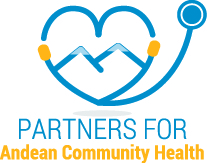Patient Stories
Healthy Families Are at the Heart of PACH's Mission
Manuela
Manuela is thirty-eight years old and has ten children, one of whom died from a fever when he was three years old. She, her husband, and her nine surviving children have lived on the beautiful mountainside of Guamote, Ecuador for their entire lives. They have a small farm where they grow corn and potatoes. They also have two milking cows and five pigs. Manuela spends her days caring for her children and tending to her plants and animals. The family consumes the majority of what she grows. Manuela’s husband spends his weeks in the nearby city of Riobamba where he earns a modest income as a driver to help support his family.
All of Manuela’s children were born at home, and she has never seen a gynecologist or an obstetrician. Overall, access to healthcare is limited for her and her family. When Manuela learned that FIBUSPAM was visiting her village and providing free general medicine consultations and gynecological exams, she was very excited. On the day of the clinic, she arrived with her children and waited to be seen by FIBUSPAM doctors and volunteers.
Manuela decided to undergo cervical cancer screening, which was performed by Dr. Amanda Horton. Using the Visual Inspection with Acidic Acid (VIA) method, Dr. Horton found that Manuela had pre-cancerous lesions, which she was able to treat immediately using cold coagulation. Because of this treatment, Manuela’s lesions will not develop into cancer. Manuela will have the opportunity to lead a productive and healthy life, and her children will continue to have a healthy mother.
In Ecuador, cervical cancer needlessly kills thousands of women each year. Currently, 36% of all women in Ecuador have never been screened for cervical cancer, the majority of whom are indigenous and have little to no access to such services. Through project Prevenir Juntos, FIBUSPAM has provided cervical cancer screening to over 1,000 women like Manuela.
Thank you to the International Foundation and Dr. Rachel Hanisch who made this project possible. Special thanks to Dr. Amanda Horton and the Temple Emergency Action Coalition who helped us treat hundreds of women.

New Vision for Byron
Byron received cataract surgery the following week, performed by Dr. David Khorram and an international team of medical professionals.
The day after surgery, Byron’s bandages were removed, and his sight was completely restored. Byron’s mother and aunt tearfully thanked Dr. Khorram and his team. They told the team that there was no way that they could afford Byron’s surgery at a private clinic in the distant capital city, Quito, and he was denied care at the local public hospital. With his vision restored, Byron has the opportunity to live a full, productive, and healthy life.
PACH & FIBUSPAM are grateful to all of our donors and volunteers who help us provide cataract surgery to hundreds of patients like Byron every year. We are especially thankful to SEE International, Dr. David Khorram, Janie Boyle, Halina Gorecki, Maria Barrosa-Hartford, Mariela Zurita, and Amy Chwialkowski who supported FIBUSPAM to complete over 40 procedures during a one week period in March 2018.

